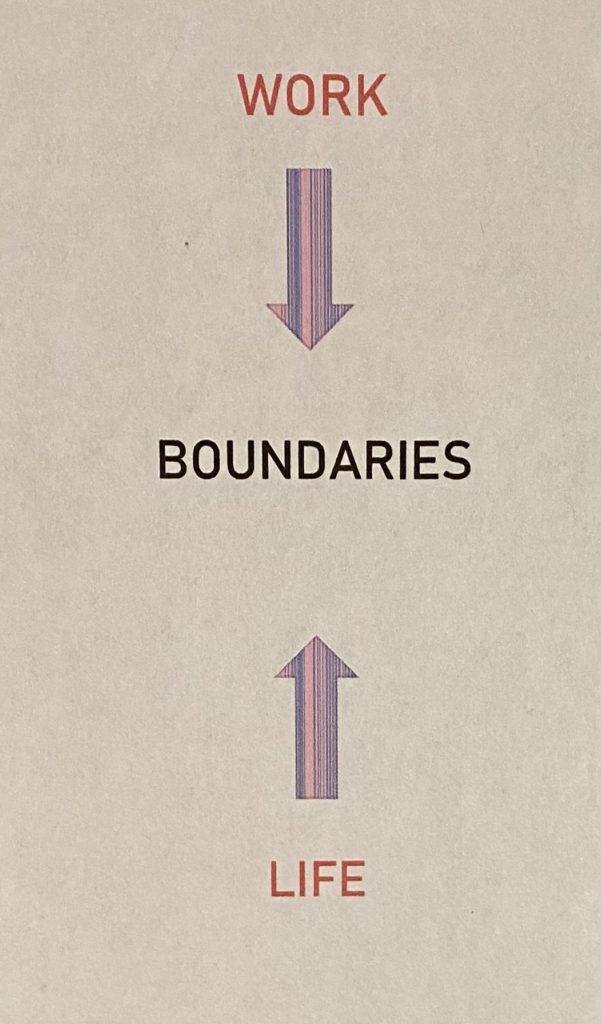
Boundaries are a hot topic right now. For folks working remotely, how does one know when to end the workday? What’s the best way to manage kids’ or other family member’s needs when on work time? Is there a designated workspace that is easily separated from family communal space?
I haven’t had to confront the Covid-19 remote work issues, having left the formal work world prior to the pandemic. Still, during my thirty years in government, I constantly evaluated my boundaries. I hope my experience will be valuable as you navigate yours.
My Role Models
Before I became a parent and needed to set work limits, I watched some influential senior folks do just that. In one case, my boss, a father to 3 boys and husband to a strong wonderful woman, was finding himself working too hard and putting too much on his wife and kids. He approached his boss, a Senate-confirmed Assistant Secretary, and explained how his long work hours were harming his home life. In a move that made an indelible mark on me, this Assistant Secretary announced at the next senior staff meeting that no one should work past 6 pm on her account. She wanted no divorces on her watch.
In another case, a very senior State Department lawyer and mom figured out how to share a management job and set limits about when she worked and traveled. This was in the 1990’s, when senior level women managers and lawyers were few and far between. She was so revered that the State Department would do anything to retain her and her expertise, so hers was the test case for a new work arrangement. Everyone who worked with her readily accepted her schedule.
Similarly, a colleague at another agency took paternity leave of 3 months. This was the first time I had ever seen a man take advantage of the Family Medical Leave Act, which passed a few years earlier in 1993. It was especially dramatic as many of us across the US government were traveling all over the world in preparation for international climate change negotiations that led to the Kyoto Protocol – something we couldn’t imagine anyone wanting to miss. It spoke volumes about the importance he put on his parenting and husband responsibilities. Rather than recede, his stature swelled.
My turn
These individuals stood up to conventional norms and set boundaries. Their example served as my guideposts as I made decisions about what I wanted when I became a mom.
By that point, I had been at DOE for 10 years, and built up a good track record. Right after my first child was born, I asked for and was granted a 4-day schedule, with the 5th day as “leave without pay.” About a year after my second child was born, I went down to a permanent, 3-day schedule, which lasted about 12 years. Then, and I believe now, working part-time in the US Government is decided on a case-by-case basis, so I was lucky to have enlightened leadership that supported my wishes. It goes without saying that I was extremely fortunate that my husband and I agreed we could afford a 20-40% hit on my salary.
Lessons from my experience
A key lesson I learned was that colleagues adjusted well and got used to scheduling meetings on days when I was there. I never worked on Fridays, which was not a big meeting day anyway, since so many took that day off for their alternate work schedules. My Wednesdays off were more of an imposition, but it almost never seemed to be a big deal. I am grateful for that.
A lot of thought went into how flexible I should be. Prior to my schedule change, I would have thought being flexible and moving around my work days to accommodate others would be the best way to be considered a good, loyal team player. Yet, I really did not want to come in on my days off, especially in the early years when I was taking a scheduled mommy and me class with my daughter — so valuable for the other moms I met. Being flexible would work against why I made the decision to go part-time.
So, I stuck to my guns and made it clear my days off were sacrosanct. I still checked my blackberry (“the” device at that time) frequently, but I was inflexible about the days I came into work. I promised myself that I would only acquiesce if there were a national or international meeting that was out of my control, or if a very senior DOE or White House person set a meeting on one of my days off.
Counterintuitively, inflexibility led to increased respect for me and my schedule. In practice, knowing I wasn’t available on specific days helped narrow down times that worked for all, in a way making scheduling easier. Also, senior level meetings were so often cancelled or shortened that I’m glad I rarely scrapped my days off.
Know thyself. Knowing myself helped me when I worried about how this could impact my career. There were times I needed to give myself a pep talk. I had to accept that I gave up being on the senior management track, as those jobs go exclusively to full-time folks at the US Department of Energy. I missed many important meetings that would have been valuable to me and my visibility. When I questioned why I did the things I did and whether it was worth it, I reminded myself of my personal core values. That is, for me, I would only be happy and consider myself successful if I had a foot planted firmly in each world – my work world and my kids’ world. Less work hours meant I got to take long, treasured walks with my dog and had time to hang out with my girlfriends – both nearly impossible when working and commuting 50+ hours per week. Neglecting friendships is unfortunately the price many full-time working moms must pay.
Disclaimer: I don’t want to offend anyone who likes or needs to work full-time and feels that their parenting or friendships are little affected. I so respect those who beautifully and tirelessly manage a full-time job and their kids’ lives. I just knew I don’t have that type of energy. I accepted my limitations and created a schedule that worked for me .
A 4-day schedule is very different from a 3-day schedule. I worked very efficiently, so I was able to accomplish as much in 4 days as most do in 5 days. However, I really had to slim down my range of responsibilities and assignments when I went down to 3 days. I was not able to volunteer for new challenges as I had always done. Also, because I wasn’t around 2 days a week, I was careful to never miss a deadline because of my schedule.
Paying it forward, I made myself available to share my time and experience with anyone who approached me about career advice, and certainly about work/life balance. This is probably what has led, in a circuitous way, to this blog that is devoted to sharing my experiences and perspective.
And now?
Things have changed so much in two years. I’m not sure that I would have felt compelled to reduce my schedule if working remotely was as accepted as today. I had a +2 hour commute a day that would not be the case now. I could have more easily been around to give my kids rides or go to their practices, games and performances. Would the pressure of a full-time job have been too much during their formative years if I had the option for remote work? It’s so hard to say.
Of course, my situation was pre-covid. Setting boundaries is made so much more difficult right now, during a pandemic. This is especially true for parents of school age and younger kids. They have to balance jobs (if lucky enough to retain them) with home schooling; serving as substitute playmates; fear of sending under vaccination age kids into schools without mask mandates; dealing with mental health, racial and gender bias issues, etc. The best we can say is that there is much more humanity around melding work and home, especially for those whose jobs allow them to work remotely.
In my boundary setting, I focused on the days I went downtown to work. Yours might be around whether you can stay remote rather than going back to the office, whether you can remain living in another location, when you are expected to read emails and slack messages, how much advance notice is provided around varied schedules, or a myriad of other issues that are rising up during the “great resignation” phase we’re now in.
I hope this blog is viewed as “paying it forward.” The real perspective I would share is to be self-reflective about what’s truly important to you and be real about your abilities and limitations.
From a statement made in the first podcast referenced below, this captures my message: “Communicating boundaries guarantees a self-determined, happy and peaceful life.” I wish you the courage to carve out boundaries that avoid burn-out and ensure a workable and happy life.
Recommended Listens:
From Jean Chatzky’s Her Money podcast, “Becoming A Boundary Boss: You Can Say No”
“Our mental “surge capacity” is maxed out,” from the Make Me Smart podcast


Some great insights and words of wisdom!!!
You’ve got me thinking, Linda. Always enjoy reading your viewpoint.
Always appreciate the insights of this blog…. But this one seems to resonate most. I think we all let work/friends/family blur together this past year, reducing the impact of each. Returning to a life of balance that incorporates boundaries will help with personal gratification.
So proud of you Linda! You managed both a big deal career and wonderful family life so seamlessly. That’s to your credit, having worked hard for many years prior to establish yourself as top talent that your employer was willing to flex for to retain. I’m sure your colleagues at DOE would’ve missed your many valuable contributions had you decided to leave and not pursue a part-time schedule.
It’s great to see more flexibility in today’s workplace…we want to keep more parents in and not force them to choose between spending quality time with family and a rewarding (and in many cases financially necessary) career track.
Linda, boundaries is such an important and often neglected subject. So many people are afraid to set boundaries at work or do not know how to do so. Thank you for sharing your wisdom on this critical topic.
Your blog said it first.
https://www.nytimes.com/interactive/2021/09/23/opinion/covid-return-to-work-rto.html
Nice job on an important subject., Linda. I recall when working at ANL when my manager was requested to come to DOE on Father’s Day to brief the DOE Manager who would testify before Congress the following week. My manager told the guy that his kids expect him to be home for Father’s Day. That was the end of the discussion.